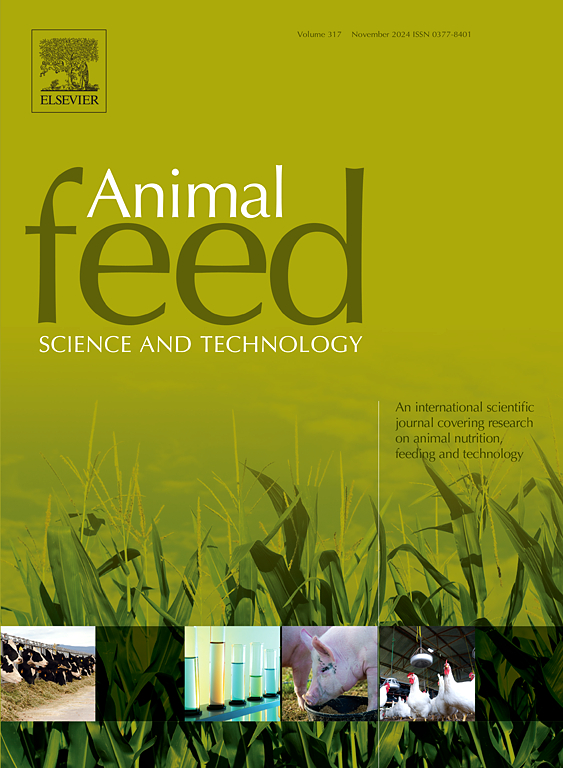Feed additive carriers affected the physiological effects of a lactobacilli-based pro- and postbiotic in broilers
IF 2.7
2区 农林科学
Q1 AGRICULTURE, DAIRY & ANIMAL SCIENCE
引用次数: 0
Abstract
To promote growth performance and health of broiler during production, additives, like pro- and postbiotics, are often used and most of them use carriers. This study aimed to investigate if carriers can modulate the physiological effects of two lactobacilli-based pro- (Pro) and postbiotic (Post) additives, and to gain more insight into their physiological effects in the absence of carriers, in broilers fed a non-starch polysaccharide-rich diet reared under practical housing conditions. A total of 1,600, one-day-old male Ross 308 chicks were equally distributed among 5 treatments (control, Pro and Post with and without their respective carriers) with 8 replicate pens each and 40 broilers/pen. Growth performance parameters, footpad lesions, and blood plasma physiological parameters related to nutrition and immunity were determined. On d35, Pro increased body weight (BW) (+2.1%; p = 0.025), while its carrier negated this effect (-1.9%; p = 0.047). Post did not affect d35 BW but increased the feed conversion ratio (FCR) by 1.3% (p = 0.041), while its carrier increased BW (+2.4%; p = 0.013), and lowered FCR (-1.3%; p = 0.042). Growth performance parameters showed a beneficial effect of Pro but not Post, while the use of their respective commercial carriers had a growth-depressing and -promoting effect, respectively. Carriers also affected the footpad lesion score, and blood parameters related to nutrition and immunity. These results highlight that additive carriers can modify the effects on broiler growth and metabolism of the pro- and postbiotic additives to which they are added. The occurrence of an additive-carrier interaction indicates that carriers for pro- and postbiotic additives for broilers must be carefully selected.
饲料添加剂载体对以乳酸菌为基础的益生前菌和益生后菌在肉鸡体内的生理效应有影响
在肉鸡生产过程中,为了促进肉鸡的生长性能和健康,经常使用前生物制剂和后生物制剂等添加剂,其中大部分使用载体。本研究旨在探讨载体是否可以调节两种乳杆菌前(pro)和后(Post)添加剂对肉鸡的生理影响,并进一步了解在没有载体的情况下,它们对在实际饲养条件下饲喂富含非淀粉多糖饲粮的肉鸡的生理影响。选取1日龄雄性罗斯308雏鸡1600只,均匀分布于5个处理(对照组、Pro组和Post组,每个处理8个重复栏,每个栏40只鸡。测定生长性能参数、足垫病变及与营养和免疫相关的血浆生理参数。在第35天,Pro增加了体重(BW) (+2.1%; p = 0.025),而其载体则抵消了这一作用(-1.9%;p = 0.047)。饲粮添加后对d35体重无影响,但可使饲料系数提高1.3% (p = 0.041),饲粮添加后可使体重增加2.4% (p = 0.013),饲料系数降低1.3% (p = 0.042)。生长绩效参数显示Pro的有利作用,而Post的不利作用,而使用各自的商业载体分别具有抑制和促进生长的作用。携带者还影响足垫病变评分,以及与营养和免疫相关的血液参数。上述结果表明,添加剂载体可以改变其所添加的前、后生物添加剂对肉鸡生长和代谢的影响。添加物与载体相互作用的发生表明,肉鸡前生物添加剂和后生物添加剂的载体必须仔细选择。
本文章由计算机程序翻译,如有差异,请以英文原文为准。
求助全文
约1分钟内获得全文
求助全文
来源期刊

Animal Feed Science and Technology
农林科学-奶制品与动物科学
CiteScore
6.00
自引率
6.20%
发文量
266
审稿时长
3 months
期刊介绍:
Animal Feed Science and Technology is a unique journal publishing scientific papers of international interest focusing on animal feeds and their feeding.
Papers describing research on feed for ruminants and non-ruminants, including poultry, horses, companion animals and aquatic animals, are welcome.
The journal covers the following areas:
Nutritive value of feeds (e.g., assessment, improvement)
Methods of conserving and processing feeds that affect their nutritional value
Agronomic and climatic factors influencing the nutritive value of feeds
Utilization of feeds and the improvement of such
Metabolic, production, reproduction and health responses, as well as potential environmental impacts, of diet inputs and feed technologies (e.g., feeds, feed additives, feed components, mycotoxins)
Mathematical models relating directly to animal-feed interactions
Analytical and experimental methods for feed evaluation
Environmental impacts of feed technologies in animal production.
 求助内容:
求助内容: 应助结果提醒方式:
应助结果提醒方式:


